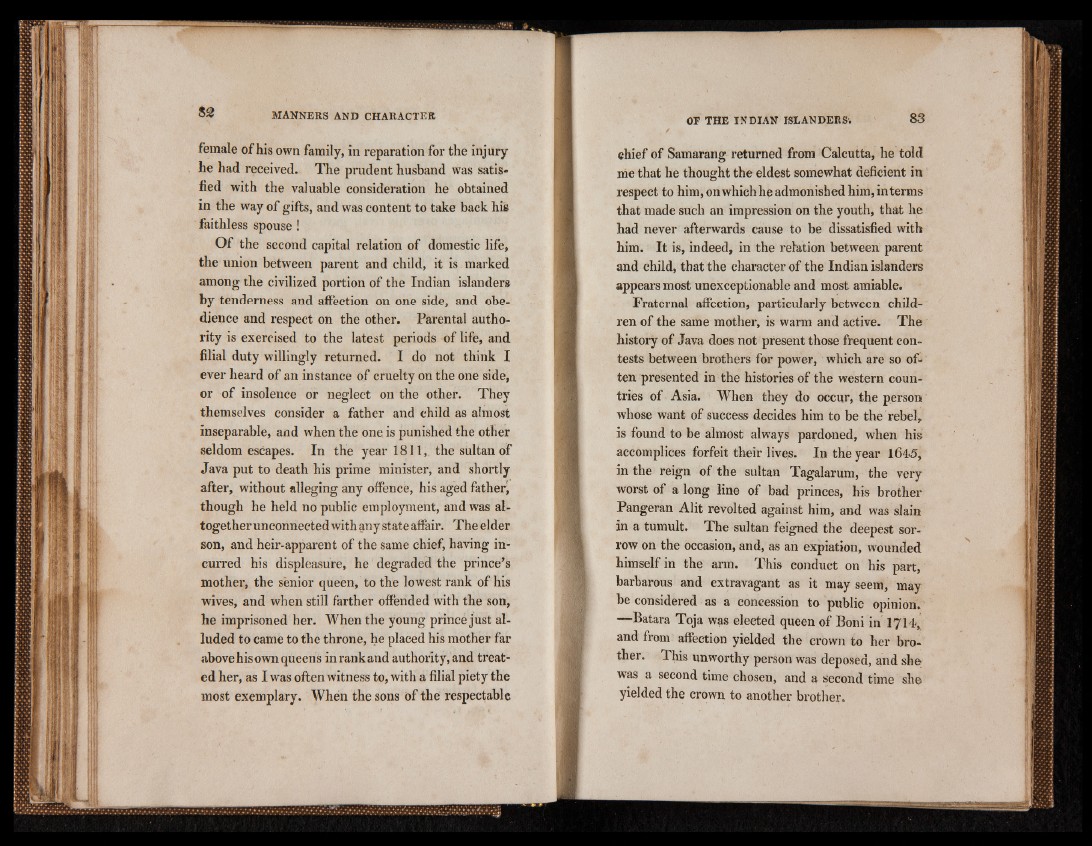
female of his own family, in reparation for the injury
he had received. The prudent husband was satisfied
with the valuable consideration he obtained
in the way of gifts, and was content to take back his
faithless spouse!
Of the second capital relation of domestic life,
the union between parent and child, it is marked
among the civilized portion of the Indian islanders
by tenderness and affection on one side, and obedience
and respect on the other. Parental authority
is exercised to the latest periods of life, and
filial duty willingly returned. I do not think I
ever heard of an instance of cruelty on the one side,
or of insolence or neglect on the other. They
themselves consider a father and child as almost
inseparable, and when the one. is punished the other
seldom escapes. In the year 1811,. the sultan of
Java put to death his prime minister, and shortly
after, without alleging any offence, his aged father^
though he held no public employment, and was altogether
unconnected with any state affair. The elder
son, and heir-apparent of the same chief, having incurred
his displeasure, he degraded the prince’s
mother, the senior queen, to the lowest rank of his
wives, and when still farther offended with the son,
he imprisoned her. When the young prince just alluded
to came to the throne, he placed his mother far
above his own queens in rank and authority, and treated
her, as I was often witness to, with a filial piety the
most exemplary. When the sons of the respectable
chief of Samarang returned from Calcutta, he told
me that he thought the eldest somewhat deficient in
respect to him, on which he admonished him, in terms
that made such an impression on the youth, that he
had never afterwards cause to be dissatisfied with
him. It is, indeed, in the relation between parent
and child, that the character of the Indian islanders
appears most unexceptionable and most amiable.
Fraternal affection, particularly between children
of the same mother, is warm and active. The
history of Java does not present those frequent contests
between brothers for power, which are so often
presented in the histories of the western countries
of Asia. When they do occur, the person
whose want of success decides him to be the rebel,
is found to be almost always pardoned, when his
accomplices forfeit their lives. In the year 1645,
in the reign of the sultan Tagalarum, the very
worst of a long line of bad princes, his brother
Pangeran Alit revolted against him, and was slain
in a tumult. The sultan feigned the deepest sorrow
on the occasion, and, as an expiation, wounded
himself in the ann. This conduct on his part,
barbarous and extravagant as it may seem, may
be considered as a concession to public opinion.
—Batara Toja was elected queen of Boni in 1714,
and from affection yielded the crown to her brother.
This unworthy person was deposed, and she
was a second time chosen, and a second time she
yielded the crown to another brother.